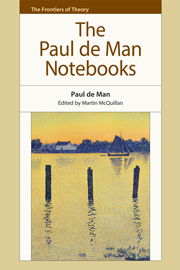Book contents
- Frontmatter
- Contents
- Series Editor's Preface
- Acknowledgements
- Dedication
- Introduction: ‘The Unimaginable Touch of Time’: The Public and Private in the Notebooks of Paul de Man
- PART I Texts
- PART II Translations
- 15 Hölderlin and the Essence of Poetry (1959)
- 16 Essay on the Origin of Language: Melody and Musical Imitation Are Being Considered
- PART III Teaching
- PART IV Research
- Appendix. The Notebooks of Paul de Man 1963–83
- Bibliography
- Index of Names
15 - Hölderlin and the Essence of Poetry (1959)
from PART II - Translations
Published online by Cambridge University Press: 05 December 2014
- Frontmatter
- Contents
- Series Editor's Preface
- Acknowledgements
- Dedication
- Introduction: ‘The Unimaginable Touch of Time’: The Public and Private in the Notebooks of Paul de Man
- PART I Texts
- PART II Translations
- 15 Hölderlin and the Essence of Poetry (1959)
- 16 Essay on the Origin of Language: Melody and Musical Imitation Are Being Considered
- PART III Teaching
- PART IV Research
- Appendix. The Notebooks of Paul de Man 1963–83
- Bibliography
- Index of Names
Summary
The five key-passages:
1. Poetry: “the most innocent of all crafts” (III, 377).
2. “Therefore, man was given language, the perilous of all blessings … that he bear witness to what he is…” (IV, 246).
3. “There is much that men have experienced.
They have called the many of the heavenly by name
Since we are an exchange of words
And one can hear from another” (IV, 343).
4. “The poets found what will endure” (IV, 63).
5. “With merit, and yet poetically, man dwells on this earth” (VI, 25).
Why is it that Hölderlin has been chosen to explore the essence of poetry? Why not Homer or Sophocles, why not Virgil or Dante, why not Shakespeare or Goethe? Is not the essence of poetry contained in the work of these poets even more fully than in Hölderlin's, whose creative period was suddenly and early interrupted?
This may well be the case. Yet, it is Hölderlin and Hölderlin alone who has been chosen. Is it possible, then, to read the general essence of poetry out of the work of one single poet? Generality – the one rule which is valid for many instances – can only be won by comparative study; it requires as large and varied a selection of poetry as can be gathered together. In this sense, Hölderlin's poetry is merely one sample of poetry among many.
- Type
- Chapter
- Information
- The Paul de Man Notebooks , pp. 171 - 182Publisher: Edinburgh University PressPrint publication year: 2014



